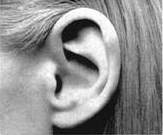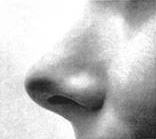Loss of hearing is very gradual, starting at middle age. The loss appears to be caused by a decrease in the elasticity of the eardrum.
Hearing loss often develops slowly and quietly. People may complain that they can hear the spoken sounds, but they can’t understand what the speaker is saying. Words that are quite different can sound the same, such as tea/pea/key, shop/shot/shock or fine/ shine/sign.
Impaired hearing affects more older adults than any other chronic condition. Although only 2 percent of people 55 and older are classified as legally deaf, 30 percent to 50 percent of older adults suffer a hearing loss serious enough to negatively affect the quality of communication and interpersonal relationships.
People have a decreased ability to hear high frequencies and sounds in general.
Sounds may be muffled and difficult to understand. Studies find that high-frequency sounds are filtered out or not heard. Therefore, asking individuals to speak louder may not make the message easier to understand.
People with decreased ability to hear may deny or be embarrassed to talk about the problem. Hearing aids, while very beneficial, never can replace normal hearing.
Many background noises from radio, television, appliances, traffic or busy public gatherings all detract from hearing normal conversation. Other obstacles that may be treatable also could be playing a part in hearing loss.
To accommodate an individual with hearing loss, try to cut down on background noise. Turn off the television or radio during conversations. Ask for quiet sections in restaurants, and try to sit away from the door at theaters.
Begin now to make hearing health a part of your lifestyle. Stay away from loud or prolonged noises when you can. Turn down the music volume. Buy power tools that have sound controls. When you must be around noise, either at work or at play, use something to protect your hearing.




